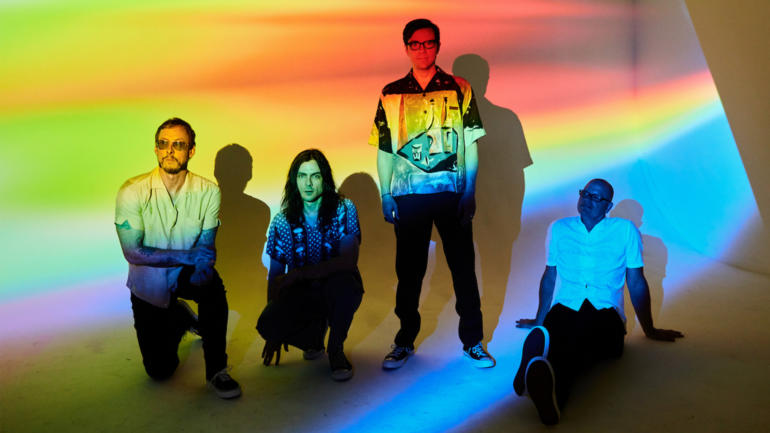Rivers Cuomo — along with the rest of his band Weezer — should have retired a long time ago. They’re like the undead of the rock and roll world (much like the Rolling Stones). But they’ve somehow maintained some semblance of popularity around the world.
I tried listening to their latest unnamed album with the cover featuring the band members in front of a teal background. It’s a throwback to previous album covers with the same set-up but with a different color scheme behind them.
Ahmad Coo is a producer and copy editor for the Global Business show on CGTN America. His analysis represents his views alone.
All the songs are covers of some of the best known adult contemporary rock/pop songs from the ’70s, ’80s and ’90s. Some of the bands and singers they cover in the “Teal album” are some of the biggest bands and singers from those decades such as A-ha, the Eurythmics, Black Sabbath, Electric Light Orchestra, and Michael Jackson.
But despite this lineup, I couldn’t even get through the first minute of each track in Weezers’ covers. It boggles the mind. Was I missing some deeper intellectual message listening to bland versions of some of the biggest hits from decades past?
Usually when a band covers a song from another group, they put their own special spin (like when the Sex Pistols covered Frank Sinatra’s “My Way“) to make it their own. But Weezer bafflingly plays every song as close to the source material as possible. If the songs sound exactly the same, I’ll just listen to original, thanks.

The Teal album cover Credit: Weezer Facebook page
You’ll be hard pressed to tell the difference between Weezer’s version of “Africa” from Toto’s monster hit. All the other tracks are the same.
There’s a complete lack of irony in this record, which the previous incarnations of Weezer would have infused with gusto.
I’m pretty sure the Teal album will win Weezer legions of new fans, and I’m happy that they’ll be able to make some money while doing it. They deserve to get paid for their earlier body of work. Unfortunately, the new record will also probably completely alienate fans who started listening to them in the 1990s, like myself.
So exactly why am I reviewing an album by a band I stopped listening to more than a dozen years ago?
It’s because Weezer was one of the most memorable rock and roll bands to come out of the early ’90s. Their first two releases, the “Blue album” and “Pinkerton“, are modern rock classics. That’s why it’s so painful that they came up with such an asinine effort in their latest work.
To me, Weezer was a direct descendant of Pavement, one of my favorite bands of all time. The stuff they sang about was thematically similar (though Pavement was a far superior group in terms of songwriting and guitar chops). Weezer was a band you naturally felt an affinity with if you were a cynical slacker with a romantic streak (like Pavement).
Some may find this comparison blasphemous, but Weezer’s frontman Rivers Cuomo was in the same mold as Pavement’s Steve Malkmus — widely considered the father of so-called slacker rock. Both wore their distrust of society on their ragged sleeves. Cuomo and Weezer wouldn’t have been possible without Pavement.
Both bands embodied the spirit of Generation X which came of age in the ’90s. We were the children of entitled baby boomers. Growing up, witnessing the excesses of materialistic parents and their go-go mentality, most Gen Xers went the other way. We were described mostly as aimless and undriven. And the rock and roll that was borne of my generation’s skepticism spawned bands like Pavement, and much later Weezer.
When Weezer came out with their second album, “Pinkerton”, I was hooked. The album is named after a character in Giacomo Puccini’s opera “Madama Butterfly”. In this album Cuomo (much like Malkmus) put into words and songs my sardonic worldview.

Cover art from Weezer’s greatest album, “Pinkerton”. Credit: Weezer Facebook page
“Pinkerton” perfectly captures the spirit of the late ’90s. It’s raw, angry, and most importantly — darkly hilarious.
Cuomo wrote most of the songs for “Pinkerton” while he was still studying at Harvard University and recovering from debilitating and extremely painful leg surgery. He was born with one leg shorter than the other, so in order to correct the condition they had to break one of his legs and lengthen it. It’s a horrific process.
Cuomo was mostly isolated, struggling with recovery after his operation, and had been unlucky in love when he wrote most of the songs for “Pinkerton”. He was also growing more dissatisfied with his rock star status. Weezer’s sudden popularity wore on him and he bemoaned the superficiality of the music industry. During this time, he found solace in listening to “Madama Butterfly” between playing live shows.
“On tour, I would listen to her every night after the show and be so moved by the depth of emotion and sadness and tragedy,” Cuomo would say in a 2015 interview with Pitchfork. “It was really calling to me, like, “Come on Rivers. You can go there. You can go much further with your music…”
It’s no surprise then that Cuomo came up with “Pinkerton” as he was mining dark material from difficult times — and it led to the creation of Weezer’s strongest songs. Many consider the album Weezer’s greatest work and prominent music critics have listed “Pinkerton” on their best album lists.
Unfortunately, it’s been all downhill since “Pinkerton”. Somehow, Cuomo and Weezer lost their way and abandoned the slacker rock genre after a groundbreaking record and decided to become power pop wannabes. (Let’s face it, the “Green album” and everything else after that majorly sucked).
Their latest “Teal album” is perhaps the band’s nadir, the final nail on a decrepit coffin — an ignominious end for a band I used to admire.
Weezer is finally dead (to me at least). But long live “Pinkerton”.
 CGTN America
CGTN America
 (L-R) Scott Shriner, Brian Bell, Rivers Cuomo, and Patrick Wilson of Weezer Credit: Weezer Facebook page
(L-R) Scott Shriner, Brian Bell, Rivers Cuomo, and Patrick Wilson of Weezer Credit: Weezer Facebook page

